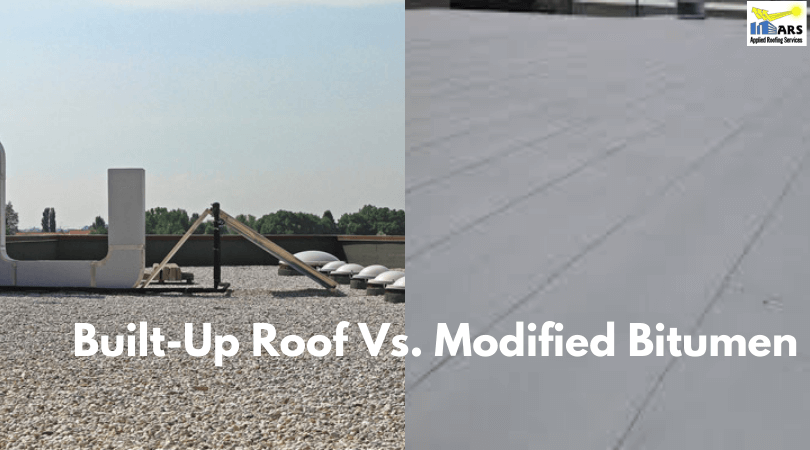


Built-up and modified bitumen roof systems are usually designed for low slope or flat roof structures. While both can withstand harsh weather conditions and harmful UV rays, the two are different in terms of design, application, advantages, and life expectancy. Read on to learn more about these roofing systems and evaluate the best option for your commercial building.
Also known as tar and gravel roofs, built-up roof systems are made of alternating layers of bitumen (asphalt) and reinforcing fabrics. The top layer of the roof is finished with stone or gravel coating to create a continuous sealed surface.
This is an asphalt-based roofing system designed with two layers, namely a base sheet and a cap sheet. While the cap sheet is torched down, self-adhered, or cold-adhered, the base sheet is self-adhered to the roofing substrate. Modified bitumen BUR can be of two types,
There are 3 types of flat roofing systems for commercial buildings - modified bitumen roofs, single-ply roofs, and built-up roofs. Therefore, it is essential to evaluate the advantages and disadvantages of each roof type to make the right decision for you.
| Roofing System | Pros | Cons |
| Built-Up Roof |
|
|
| Modified Bitumen Roof |
|
|
| Single-Ply Roof |
|
|
There are two main types of built-up roofing systems, including:
Made of rubber and asphalt, this roof is finished with gravel on top. The modified BUR can be installed on the roof deck using adhesives. Modified bitumen BUR roofs have three layers, including: Base Asphalt Layer This acts as a primary waterproof layer and is modified with synthetic rubber to create a uniform matrix. While strengthening the asphalt, the synthetic rubber improves puncture resistance and elasticity. Ply Sheets These sheets can be made of plastic core materials, felt, reinforced fabric, polyester, or fiberglass. They offer weather resistance, stability, and tensile strength to the final finished roofing structure. Top Surface While protecting the lower layers from rain and debris, the top surface holds and releases sunlight to prevent moisture and heat damage.
A ballasted roof has a loose-laid bottom-most sheet on the roof deck that separates the roof membrane from the decking material. Though not adhered or anchored, the top layer of the roof is ballasted with gravel stones to keep the roof membranes in position. In order to prevent excess movement, roof membranes are fastened at certain places on the deck. While providing an aesthetically pleasing look, the ballast roof remains durable by contracting and expanding during cold and hot weather. These roofs are also fire-resistant, energy-efficient, and easy to repair.
A built-up roof system is made of three layers: Base Sheet The asphalt in the base sheet is fastened to the insulation or roof deck to prevent blisters (soft bubbles) and allow vapor movement. You can use industry-standard fully adhering base sheets to prevent the membrane from tearing. Roofing Felts These are reinforcing fabrics (organic mats or fiberglass) that increase the roof’s durability while resisting thermal shock and moisture. Surface Layer The surface layer with stone, gravel, or mineral granules is finished with aluminum roof coatings, hot asphalt, or elastomeric sealants to withstand dampness and UV rays.
Generally, BUR roof systems are prone to the following defects:
Regular roof maintenance by a professional roofing contractor can help detect these repairs before they aggravate. This way, you can fix the repairs on time and maintain your roof in top condition.
While both roof types have advantages and disadvantages, deciding which one is the best for your commercial property depends on your requirements, the building’s condition, and your roof’s pitch. Therefore, consider hiring a commercial roofing contractor to determine the best roof for your building.
With over two decades of experience in the roofing industry, our team at Applied Roofing Services specializes in commercial flat roofing systems, low slope roofs, and green roofing solutions. All our roofing systems are of high quality, ensuring low maintenance and durability. We also have experienced and highly trained roofing professionals who can install your commercial roof in an efficient and non-intrusive manner. If you are looking for the best commercial roofing contractor in California for installation, repair, and maintenance services, contact Applied Roofing Services today at 714-632-8418 or get a quote online.